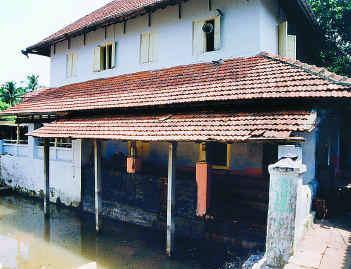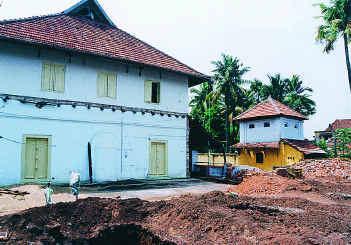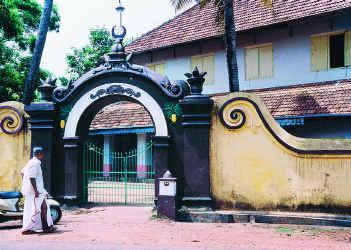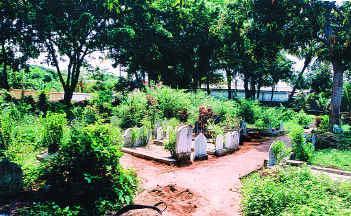The ancient Calvathy mosque is steeped in history. PRIYADARSSHINI SHARMA traces its origin and antiquity as it is poised to get two more floors to accommodate believers.
WHEN IT comes to antiquity, every nook and corner of Fort Kochi has a timeless past. While the St Francis Church and the Jewish synagogue hog the limelight as `must-see’ in a traveller’s itinerary, many are unaware of the very ancient Calvathy Jamath Mosque, which exists rather silently along the road connecting the two famous monuments.
It is a historical curiosity that so many varied communities who came to Kochi in succession, settled here to form a long lasting affair with the land and became an indelible part of it. None rampaged the land but settled down harmoniously, imparting richness to its history. The Arabs, who were the first to come for purposes of trade, established places of worship, to which the Calvathy mosque belongs.
Dating back to the 14th century, it is claimed that the traders, in order to perform their religious rites, built it in the year1384, where historical evidence of records of prayers exist for the last 619 years. Records tell about a trader, Makkar, from Parapanangadi who elevated the existing structure to its present form. From then on several additions were made to it, with the passage of time. The mosque is credited with the fact that many distinguished personalities like Makki Thangal, renowned for his Quranic interpretations and literary works is buried in the adjoining cemetery, just as the mausoleum of Faridudeen Aulia, is erected on the Eastern side of the mosque. The tomb of Faridudeen Aulia, is renowned throughout the country, as he was a preacher of the Koran and was respected and loved by one and all. Thus on Thursdays and Sundays special prayers are offered to him.
Built in a typical Kerala style the mosque has a timber ceiling and no minarets. A water tank in the centre is in keeping with the traditional architecture. The 2-acre plot which houses the mosque has a burial ground and is planted with many rare trees. Presently plans are afoot to build extensions to the mosque. Says the secretary Mr.A.K RajaAnwar, ” We propose to build two floors of 4000 sq ft to accommodate the believers. It will be in keeping with the style.” Managed till a few years ago by the well-known stevedoring Poovath family, the mosque was managed by Paree Moopan, Abdul Rahimkutty Moopan and Bava Moopan.
In the 1940’s a controversy led to the closure of the mosque, which was resolved in the hands of a popular and loved Imam Maroham Mohammed Ali Musaliar. Hailing from Aluva he was respected and followed the Shariat of Islam. He managed the premises for a good 40 years where, besides managing the day-to-day affairs, he also planted a variety of rare trees in the mosque grounds. In the late sixties, prominent persons like T.K Pareekutty, Abdul Rahim Kutty Moopan, Poovath Hassan, V.K. Hamza, Mohammed Koya, with Poovath Hassan as president formed a working committee to run the mosque.
Today, the Jamath Pally manages the mosque along with a few other mosques in the area. A laudable feature of the Calvathy mosque is that its burial grounds are open to other sects of the Muslim community too.
Calvathy, facing the Western side of the mosque, was the first wharf in Kochi and had an active maritime tradition, much before Sir Robert Bristow planned the present port at Willingdon Island. It was the ancient hub of all sea faring activities, in sharp contrast to the neglected locality it is today. An ancient structure like the Calvathy mosque remains deprived of its historical due and it is time the mosque finds a rightful place among the sites and sounds that contribute to the antiquity of Fort Kochi .
source: http://www.hindu.com / The Hindu – Online Edition / Home> Features> Magazine / by Priyadarsshini Sharma / Thursday – May 15th, 2003












